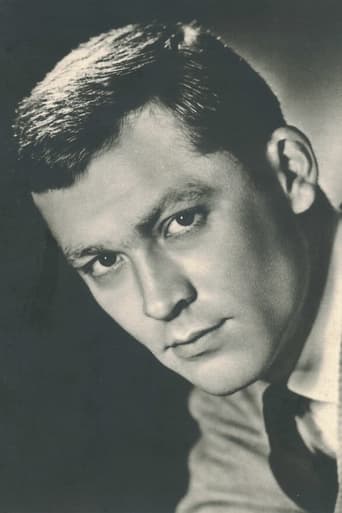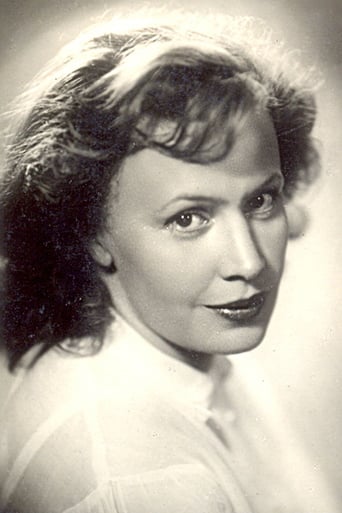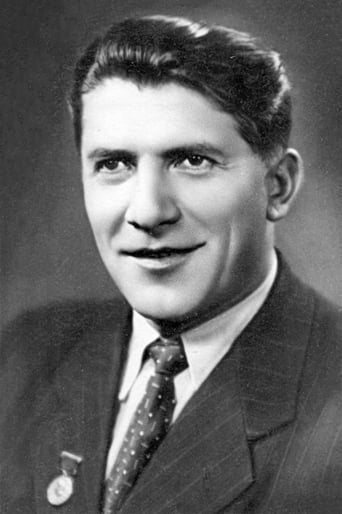Scanialara
You won't be disappointed!
Ceticultsot
Beautiful, moving film.
Deanna
There are moments in this movie where the great movie it could've been peek out... They're fleeting, here, but they're worth savoring, and they happen often enough to make it worth your while.
maria m
The 1959 Soviet film entitled "Ballad of a Soldier," directed by Grigori Chukhrai is set during World War ll. The film revolves around a young enthusiastic 19 year old soldier named Alyosha who receives a medal for his heroic act in the front when he single handedly destroys two German tanks. Instead of this he appeals to be granted leave for a few days to visit his mother. Throughout his journey home he comes to fully realize the turmoil and affect of war on humans. One of the many themes this film portrays is "heroism." At the beginning we immediately realize that Alyosha isn't particularly this traditional amazing hero as we see him fleeing from the German tanks, but his instincts to survive has him become an accidental hero. This isn't writing off his title of a hero in any way. The presentation of a heroic act between the scene of him staying back to deliver the message that a group of tanks were heading their way, to the scene of him saving countless people from the train wreckage that happens later in the film is comparatively different in the portrayal of a hero. The treatment in soldiers from the beginning of the filming towards the end is significantly different as at the beginning many citizens were willing to help Alyosha get home, but near the end it was difficult to have someone take him merely 5 miles to see his mother. He was treated as a "good for nothing" or obstacle especially in the scene where he had saved several people from the train wreck. Chukhrai usage of angles is rather unique, for example the deep focus shot that is slowly turned upside down when Alyosha is running away from the German tanks gives a sense of disorientation and loss that the battlefield is composed up. Chukhrai especially like to elongate characters and objects perhaps to highlight the importance these elements have on the film. Although the film does respect authority figures and idealizes soviet workers it does devote a lot of its attention on the humanistic picture that is powerful as it is devastating. For example the scene were Alyosha meets a veteran who lost his leg and is hesitant to return to his wife. It was through Alyoshas constant optimistic view on the situation that made this reunion possible.
Calvin Edward Curtin
Sitting down to watch this movie with no idea of what was to come, judging directly from the cover, I was expecting a Soviet war epic full of nationalism and destruction of fascism. The first scene of Alyosha did not disappoint in that aspect, and I was prepared to sit through another generic war flick. But then things changed dramatically when he asked to go home. From then on out it was a play of emotions. From the emotions that the people Alyosha was running into were experiencing, to the hard anxiousness of Alyosha trying to get home and running into seemingly impossible obstacles the entire way. A range of emotions were experienced. The man missing a leg was heartbroken that his wife would have to deal with him for the rest of her life and didn't want her to go through it, only to find that she was overjoyed to see him again regardless of what had happened. Anger and resent was felt from Alyosha as he discovered an unfaithful wife still living in her husband's home. Anger and resent soon switched to hopefulness by the father of the soldier Alyosha met upon leaving the front. But the most powerful presence in the film was the constant fear in the back of your mind that time was quickly running out for Alyosha to see his mother, missing a train here, dealing with a transport soldier there, having to deal with the German attack on the train. All of the anxiety and time crunch came to a head when Alyosha could only hug his mother and speak with briefly just to have to get back onto a truck and go back. Imaging the pain of a mother not seeing her son for months on end, not knowing if he's dead, alive, wounded, or captured just to see him for a few fleeting moments is heartbreaking. What I felt this movie portrayed was the separation of people. War is one thing, but the longing, heartbreak and hope that is held by loved ones behind the lines is so powerful and rarely touched upon by movies. Hands down one of my favorite war movies of all time.
Justin Bishop
During World War II, Pvt. Alyosha Skvortsov (Vladimir Ivashov) receives a commendation for his heroism, and elects to take a four day leave to visit his mother. Ballad of a Soldier follows him along what should be a simple train ride, but turns into a masterpiece of beautiful humanism. The story not only follows one soldier, but through his encounters it also exposes Russia as a whole during wartime, from his talking in the soldiers only train-car to when he finally returns to the village and hears from the wives left at home.Ballad of a Soldier manages to span an entire culture and war in just four days along a train track. While director Chukhraj must remain loyal to the Party, he manages to still show the flaws some soldiers had, while showing how some could be truly selfless. During one encounter as Alyosha is caught, he is forced to give away his rations to a greedy guard, and the guard's commander catches the bribe in the act. Rather than punishing the hitchhiking Private, the commander punishes the greedy guard and allows Alyosha to carry on his journey.In the span of just four days Alyosha falls in love with a girl, while in the span of just 90 minutes the viewer falls in love with Alyosha and his story. The announcement at the start of the film that Alyosha is dead makes his experiences all the more impactful, knowing that he will never return home again, and assuming that he may never see his love Shura (Zhanna Prokhorenko) after he leaves her.Alyosha is an idealization of what many Russian soldiers were: Young, and willing to give anything for their country. He is both brave and fearful, and along his epic trip he never hesitates to give help to those around him. The favor is returned to him by civilians such as a truck driver whom he rides with, eager to support a soldier in any way they can. Through his story, soldiers and civilians alike are immortalized, in their sacrifice during World War II.
Artimidor Federkiel
Grigori Chukhray's film "Ballad of a Soldier", shot in 1959 in the Soviet Union, somehow miraculously happened against all odds. The board which had to decide whether the film should be made called its script shallow and a thing about a boy, a girl and a leaking roof that isn't worth to be made in the Soviet Union. Chukhray, who referred to it as the film of his lifetime, also insisted on changing the leads to unknown actors, there was an accident on the first day of shooting, then the director himself turned ill when they restarted, finally a mutiny cost him half of the crew - and once the film was finished it was recommended not to show it in larger cities of the Soviet Union. It won in Cannes, though.Well, "Ballad of a Soldier" was worth all the trouble. It's not about the Soviet Union, the Nazis, battle scenes, violence or death. It's about a young WW II soldier lucky enough to have a heroic moment and get permission to return home for a few days. You might call him the unknown soldier. In this road movie of the different kind you learn a lot about life far away from the front lines, it's about people and their varying struggles during the times of war. The voyage to what seems to be the other end of the world results in one of the most compassionate, humanistic, even poetically beautiful war-related movies. Plus the restored print is as perfect as it can be, making this one a shining gem in every movie-lover's collection.Additional Note: If you've acquired a taste for emotional war drama between the front and back home, there's of course that other Soviet key film you shouldn't miss either. Mikhail Kalatozov's "The Cranes are Flying" focuses on a couple torn apart by the woes of war, features powerful imagery on an emotional roller coaster ride and is as universally tangible as Chukhray's film.






